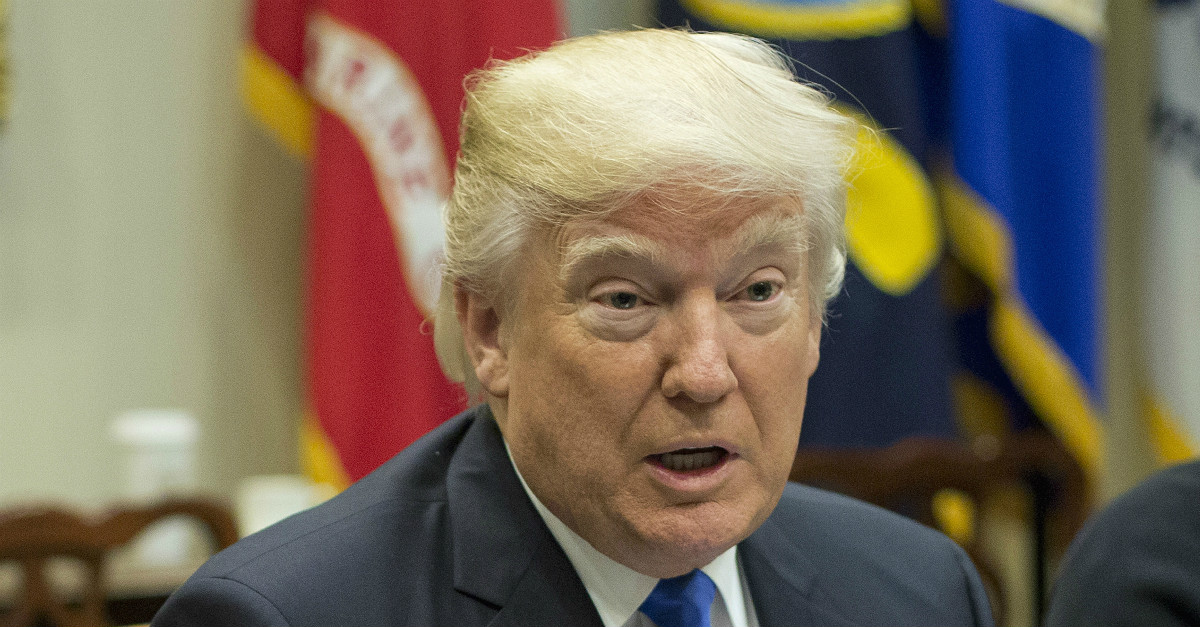What in the world is Donald Trump going to do about China? The answer to that question differs depending on what expert you ask, but it generally ranges from “finally counter expanding Chinese power” to “start a nuclear war.”
Videos by Rare
Beijing is a major bugaboo for Trump. During the presidential campaign, he repeatedly attacked the Chinese for everything from currency manipulation to military expansion to refusing to abide by WTO trade rules. It was a seismic change as go presidential candidates, who usually rank China low on the hierarchy of dastardly villains facing the country, with Sunni terrorism and Russia occupying higher rungs.
Apparently it was no campaign ploy. Almost immediately after the election, Trump took a phone call from the prime minister of Taiwan. This took a sledgehammer to the “One China Policy,” a key plank of Sino-American relations, under which the United States formally regards Taiwan as part of China and doesn’t maintain diplomatic relations with Taipei.
Once is a mistake; two’s a pattern. During his press conference earlier this week, White House Press Secretary Sean Spicer declared that it’s the intent of the United States to prevent Chinese expansion onto islands in the South China Sea. “It’s a question of if those islands are in fact in international waters and not part of China proper, then yeah, we’re going to make sure that we defend international territories from being taken over by one country,” Spicer remarked.
RELATED: Donald Trump is right to take a more aggressive stance against China
It was a cannonball into the international swimming pool, and it drew a prompt rejoinder from the Chinese foreign ministry, which warned that “the United States is not a party to the South China Sea dispute.” Subtext: You’re not wanted here; take a hike. They have a point. The contended islands in the South China Sea are thousands of miles away from the United States and mostly uninhabited. If we didn’t have an interest in defending Aleppo, then what on those tiny archipelagoes could possibly merit our attention?
The problem lies with what surrounds the islands, namely international waters through which crosses $5.3 trillion in annual international trade. China is currently building military facilities on the Spratly Islands (even though they’re also claimed by Vietnam, the Philippines, Malaysia, and Brunei) and the Paracel Islands; if it can militarize the coral atoll Scarborough Shoal (disputed by Taiwan and the Philippines), it could form what some analysts call a “strategic triangle,” three vertices of sea-based military power that would allow it to constrict and control commerce through the South China Sea.
Those little green-and-white-streaked islands, then, are deceptively important to the United States. Turning them into military bases would help China cement its status as an East Asian hegemon. It would spook American allies like Australia and Japan. It would threaten to rattle the free-trade architecture that underpins the world economy.
RELATED: Don’t mourn the TPP: Free trade will be better off without it
Yet despite their outsize importance, it should go without saying that Scarborough Shoal and the Spratlys are not worth fighting a war over, one that would have the potential to wreak mass devastation. The historian Graham Allison warns that, in 12 out of 16 cases where a rising world power has confronted a sitting one, the result has been an armed conflict, and usually a bloody one; with China unstoppably ascendant, we must make sure this is one of the exceptions. The coming years will require diplomacy not belligerence, calculation not emotion, and a willingness to talk with the Chinese discreetly and in person as opposed to coughing up geopolitical hairballs on Twitter.
I never thought I’d type these words, but Donald Trump is forward-thinking, at least on China, which he recognizes as a more potent long-term threat than that glorified petrocrat in Moscow and low-tech ISIS jihadists. But his policy towards Beijing has so far been counterproductive. He and Sean Spicer have unnecessarily heightened tensions while unwittingly relieving more peaceful means of pressure by pulling out of the Trans-Pacific Partnership and driving American trading partners into Chinese arms.
Disconnected from a broader strategy, this could become very risky very quickly. It’s time for Trump to get off Twitter, sit down with his advisors, and think—really think—about China, before the United States wades further into dangerous waters.



